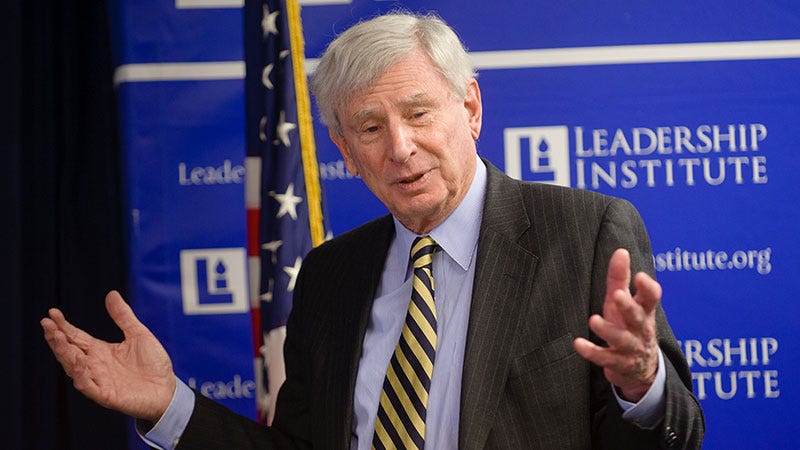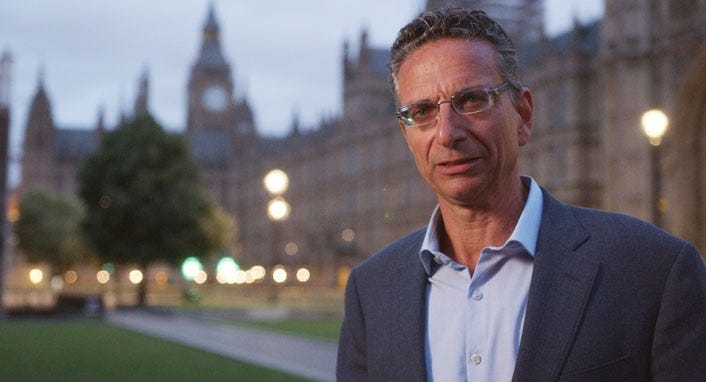Nat gazer
What nationalist-populists get wrong about freedom, virtue, and American conservatism
When Freedom Conservatives released our Statement of Principles last summer, we warned that authoritarianism was “on the rise both at home and abroad.”
“More and more people on the left and right reject the distinctive creed that made America great,” we stated, “that individual liberty is essential to the moral and physical strength of the nation.”
Because the hundreds of activists, scholars, journalists, litigators, and other conservative leaders who’ve signed the FreeCon statement have spent most of their careers contesting the claims and policy prescriptions of the Left, it surprised some observers to see us criticizing the nationalist-populist Right.
We believe consistency is a virtue, however, and that unless American conservatism offers a compelling vision of the future — one based on free markets, limited government, civic virtue, strong families, the rule of law, and decentralization — we cannot hope to compete effectively with the progressive Left.
To the extent National Conservatives and other voices on the nationalist-populist Right espouse a different vision, we consider it our obligation to challenge them.
We will offer substance, not rank sensationalism, and seek to persuade, not destroy. But we will press our case for Freedom Conservatism, believing that only by applying the timeless principles of liberty to the challenges of the 21st century can the American Right build a majority coalition capable of governing our great country.
Today, we feature several FreeCons and allies who argue this case with wit and grace.
Fusion engine
Donald Devine is senior scholar at The Fund for American Studies and a FreeCon signatory.
In the early 1980s, Devine served as President Ronald Reagan’s civil service director. The Washington Post labeled him “Reagan’s Terrible Swift Sword of the Civil Service” for cutting bureaucratic excesses and reducing billions in spending.
Before and after his government service, Devine was an academic, teaching at the University of Maryland and Bellevue University. He’s been called one of the dozen “leading lights” of the postwar fusionist reevaluation of conservative and libertarian thinking.
Devine writes regularly in The American Spectator, The Imaginative Conservative, and Law & Liberty, and is the author of 11 books, including an anthology of essays entitled Ronald Reagan's Enduring Principles: How They Can Promote Political Success Today.
In a Law & Liberty review of the new paperback version, his fellow FreeCon Richard Reinsch wrote that Devine “reminds us that the more things change, the more they stay the same.”
“The GOP obviously needs to grow its appeal among wider groups in America,” Reinsch explained. “Yet Reagan won in 1980 by adding white ethnics, evangelical Democrats, and then capturing larger numbers of Hispanics in 1984.”
In an essay for the American Institute for Economic Research, Devine described another important theme in his book: the danger that excessive federal spending poses to civil society and true self-government.
“Means-tested welfare necessarily crowds out the poor from productive employment by substituting government grants for family earning and community support,” he wrote.
“Over time, those who receive benefits tend to become entrapped by what seems easy money coming in. But becoming dependent, they find it difficult to move back from easy money to obtain the positive but more difficult benefits of jobs, marriage, and association.”
In his own appreciation of Devine’s book in National Review, fellow FreeCon Jack Butler put it this way: “It is impossible to capture the anthology’s breadth without reading it. Nor is it possible to appreciate the staggering and relentlessly questing intellect behind it without doing so.”
Key to Locke
Joseph Loconte is a Presidential Scholar in Residence at New College of Florida and the C.S. Lewis Scholar for Public Life at Grove City College. A Senior Fellow at the Trinity Forum, Loconte is also a FreeCon signatory.
Among the books he’s authored is the bestseller A Hobbit, a Wardrobe, and a Great War: How J.R.R. Tolkien and C.S. Lewis Rediscovered Faith, Friendship, and Heroism in the Cataclysm of 1914-1918.
In a recent article for National Affairs, Loconte took to task authors on the nationalist-populist Right who claim John Locke’s influence on the American Founding “explains the wretched condition of our national culture.”
“The decline of religion, the breakdown of the family, the idolization of the free market, the soul-destroying materialism, expressive individualism, and widespread moral rot: All of these ills are laid at Locke's doorstep, tied to his conceptions of equality, freedom, and natural rights.”
Loconte rejects the nationalist-populist take on the English philosopher as ill-informed.
“The last half-century of scholarship on Locke has convincingly refuted this portrait,” he wrote. “Yet there is a much deeper problem than intellectual laziness among Locke’s conservative critics: Not unlike the progressive left, they fail to grasp how the preservation of republican government depends on the inculcation of republican virtues.”
Locke was, in fact, a powerful and influential advocate for the cultivation of virtue by parents and educators.
“It is reasonable to wonder, with all due respect, whether these critics have read any of Locke's works,” he wrote. Their brand of conservatism, “disconnected from historical realities, is a creature of recent invention.”
Another conservative defender of John Locke is the aforementioned Donald Devine. In an essay recently republished in Modern Age, he described Locke as “one of the few major philosophers who can be used to provide a theoretical and moral foundation for American and Western regimes organized around the concept of liberty.”
Direct the federal beast?
Kevin Kosar is a senior fellow at the American Enterprise Institute. A FreeCon signatory, he edits UnderstandingCongress.org and hosts the Understanding Congress podcast.
Before joining AEI, Kosar served as vice president of policy and director of the Governance Project at the R Street Institute. He also cofounded the Legislative Branch Capacity Working Group, a transpartisan project to strengthen the legislative branch.
He previously spent more than a decade working for the Congressional Research Service and taught public policy at New York University.
In a recent article for The Dispatch, Kosar critiqued nationalist-populist politicians and activists who advocate a supposedly “conservative” version of industrial policy and central planning.
“It’s peculiar to see these ideas proposed by the same people who call for cutting federal spending, ‘draining the swamp,’ and getting the feds off Americans’ backs,” Kosar wrote. “They seem to think they can reconcile these competing notions by empowering the president to yoke and direct the federal beast more firmly.”
The verdict of history is clear: such attempts will always fail.
“Federal policymaking is an inherently fraught enterprise,” Kosar wrote. “So many things can go wrong even when you have the smartest people with the best intentions in the room.”
One example from the 1930s was chronicled in Edward Banfield’s classic work Government Project, a new edition of which Kosar has recently released.
More coverage
David Cowan, a Ph.D. candidate at the University of Cambridge, wrote about FreeCons and NatCons for FUSION magazine, placing the contest in a broader context. “British and American conservatism have never been identical,” he wrote. “Even so, conservatism in Britain, including its traditionalist strands, is quite different from counterparts in continental Europe. While there are certainly important points of difference with American political traditions, there is also significant overlap. Alongside British conservatism’s attachment to customs and institutions is a spirit of liberty.”
In The American Conservative, Sumantra Maitra praised FreeCons for opposing attempts by local Belgian officials to shut down the latest National Conservatism conference in Brussels. “Ultimately, however, the common enemy of the FreeCons and the NatCons is the same,” Maitra wrote, “an unelected political and bureaucratic class, ever-growing and self-sustaining — an edifice, a superstructure, a governance by swarm.”



